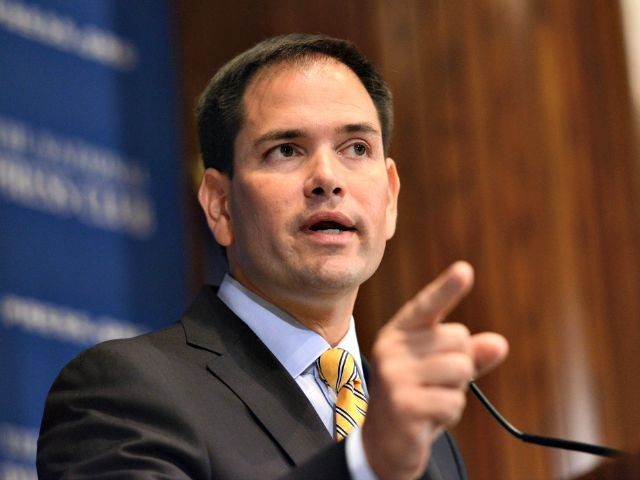WASHINGTON, DC – Sen. Marco Rubio (R-FL) signaled Thursday that resolving the ongoing humanitarian and political crisis in Venezuela remains a “personal priority” for the Trump administration.
He made the remarks during a roundtable discussion with Mario Diaz-Balart (R-FL), Carlos Curbelo (R-FL), and Ileana Ros-Lehtinen (R-FL). Rubio confirmed he had had “three separate discussions in person with the President” on confronting the regime of dictator Nicolás Maduro, as well as Secretary of State Rex Tillerson and Ambassador to the United Nations Nikki Haley.
“We’re grateful to the president and to this administration for their strong commitment to this cause, as we saw earlier this week that they implemented additional sanctions. The president from his earliest days in office has proven this time and again by taking important action,” Rubio said.
Rubio: Venezuela crisis is a "personal priority" for President Trump pic.twitter.com/5C4M37itiB
— Ben Kew (@ben_kew) July 28, 2017
“It is a personal priority for the president,” he continued. “I know because I have spoken to the president three times just in July. It is an issue he cares about, he is engaged in it, and I think he has already proven he is serious about it and I expect there will be consequences.”
Meanwhile, Rep. Mario Díaz-Balart praised the clarity of the White House’s position on Venezuela and repressive regimes, comparing it to the failings of the Obama administration.
“The message has been very clear whether it is with sanctions or statements, that there is very little tolerance for the lack of human rights in Venezuela,” he said. “So I feel assured, as that might not have been the case in the past with the previous administration. But with this administration, not only with Venezuela, but with the whole Western hemisphere, we’re seeing a very sharp concentration on supporting human rights and standing up to repressive regimes.”
During his presidential campaign, Trump promised to stand up to repressive regimes such as Venezuela and Cuba and advocate for freedom in their homelands.
“Venezuela is a beautiful, vibrant, and resource-rich country, filled with amazing and hardworking people. But Venezuela has been run into the ground by socialists,” he said during a speech last September. “The next President of the United States must stand in solidarity with all people oppressed in our hemisphere, and I will stand with the oppressed people of Venezuela yearning to be free.”
In Feburary, Trump invited Lilian Tintori, the wife of the Venezuelan opposition leader and former prisoner of conscience Leopoldo López, to the White House to discuss the crisis and call for López’s release. Rubio was also present at the meeting.
Venezuela should allow Leopoldo Lopez, a political prisoner & husband of @liliantintori (just met w/ @marcorubio) out of prison immediately. pic.twitter.com/bt8Xhdo7al
— Donald J. Trump (@realDonaldTrump) February 15, 2017
Following the result of a referendum in which an overwhelming majority of Venezuelans rejected Maduro’s plan to create a “constituent assembly,” Trump warned that the United States would “not stand by as Venezuela crumbles” and would impose “strong and swift economic actions” should the plan go ahead.
“Yesterday, the Venezuelan people again made clear that they stand for democracy, freedom, and rule of law. Yet their strong and courageous actions continue to be ignored by a bad leader who dreams of becoming a dictator,” he said in a statement.
Trump has also taken efforts to roll back Barack Obama’s “Cuban Thaw,” which involved increasing trade and removing travel restrictions on Americans to enrich the Cuban economy, which is almost exclusively controlled by the Cuban military. He has since replaced these restrictions in an effort to prevent the flow of funds to “repressive members of the Cuban military government.”
After the death of Cuban dictator Fidel Castro last November, Trump described him as a “brutal dictator who oppressed his own people for nearly six decades,” while Obama extended a “hand of friendship” to Cubans and claimed Castro had an “enormous impact” on the world.
Rubio claimed there is broad support for action on Venezuela across Congress. “At a time when there aren’t a lot of bipartisan agreements, the cause of the Venezuelan people is one that unifies us,” he added.
You can follow Ben Kew on Facebook, on Twitter at @ben_kew, or email him at bkew@breitbart.com.

COMMENTS
Please let us know if you're having issues with commenting.